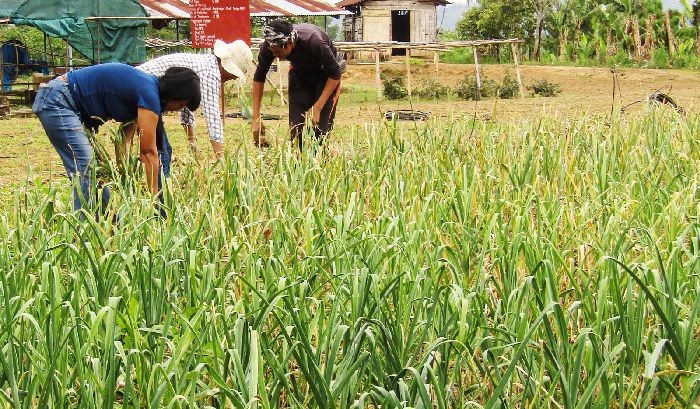Study on ‘effect of different manures and fertilizers on growth and yield of local garlic’ (Allium sativum L) was conducted at SARS Yisemyong for two consecutive years. (Photo Courtesy: SARS)

SARS conducts study on ‘effect of different manures and fertilizers on growth and yield of local garlic’
Mokokchung, October 5 (MExN): Garlic is an important crop grown for its cloves and green top leaves. In Nagaland, it is normally grown in homestead gardens and in kitchen backyards for home consumption, medicinal uses and as a source of income for many small scale farmers. Yield and quality of garlic widely depends on climate, cultural practices, variety and nutrient management of the soil.
Farmers are aware of the benefits of organic cultivation but traditional organic inputs such as crop residues and animal manures cannot meet the required crop nutrient demand over large areas. One of the major factors for low productivity is the lack of knowledge for proper nutrient management.
Use of inorganic fertilizers is fast and easy in providing quick nutrient supply to the plants. However, chemical fertilizers which was once a boon in the past, is a curse in the present era. Their excessive uses in modern agriculture have taken a toll on human health and jeopardize the environment.

Judicious use of fertilizers, organic manures and bio-fertilizers help to improve productivity, profitability and save the soil from hazardous pollution and degradation.
The study on ‘effect of different manures and fertilizers on growth and yield of local garlic’ (Allium sativum L) was conducted with an objective to promote Integrated Plant Nutrient Management System in garlic in order to maintain soil health, enhancing soil fertility and productivity, informed a press release issued by Temsuinla Jamir, Jt Director (Agriculture), State Agriculture Research Station (SARS), Yisemyong.
Benefits of manures/ Fertilizers used
Wood ash: Wood ash is both organic and inorganic residue acquired from burning of wood and contains potassium, phosphorus, magnesium, calcium and the micronutrients. Using wood ash improves plant health, growth and yield.
Vermicompost: Application of vermicompost in garlic had shown remarkable result in growth and health. Earthworms’ waste (vermicast) contains 19.58% Phosphorous (P2 O5) and 7.37% Nitrogen (N2) which helps plant foliage to grow strong and improves the overall plant health.
Annapurna: This is organic manure rich in humus, enriched with millions of beneficial Nitrogen, Phosphorus, Potassium (NPK) and Zinc mobilizing bacteria. It also contains pseudomonas and Trichoderma which act as bio-control agents to prevent diseases.
Pig manures: Pig manure is known as black gold, widely used in gardens. It aerates the soil, allow roots to penetrate easily, help retain moisture and add nutrients to plants. It increases crops yield and plant nutrient concentration, especially of N, P and K.
Vermi wash: This is a dark coloured liquid which is drained out from the vermin beds and collected. It has enzymes which stimulates the growth and yield of crops, promotes root growth and nutrient absorption. It is 5 times richer than vermicompost, improves nutrient status of soil and can be added to compost pits to hasten the degradation process.
N: P: K: Chemical fertilizers seep through the soil leading to contamination, but when it is used in small quantities it is non-toxic. Nitrogen improves vegetative development of plants giving healthy green colour to leaves, Phosphorous promotes root growth and increase disease resistance and Potassium enables plants to resist diseases, and other adverse conditions.
“From the studies conducted during rabi seasons at SARS Yisemyong for two consecutive years, all results showed significant effect on growth and yield of garlic. However, application of vermicompost recorded the highest yield followed by application of pig manure and vermiwash. All treatment has wood ash incorporated,” Jamir stated.
Therefore, application of wood ash and vermicompost is recommended to farmers interested in organic cultivation of local garlic, she added.




